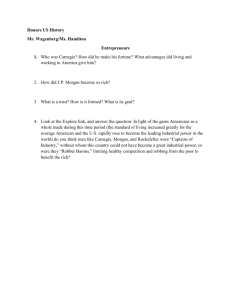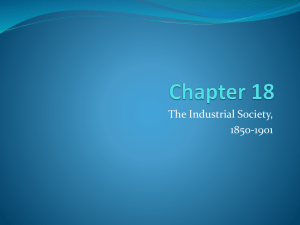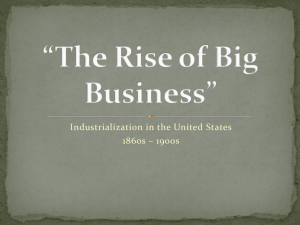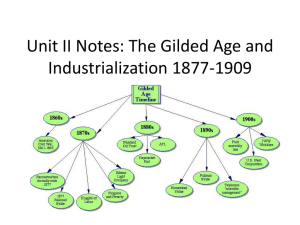Reading Test: Gilded Age (Sections I
advertisement
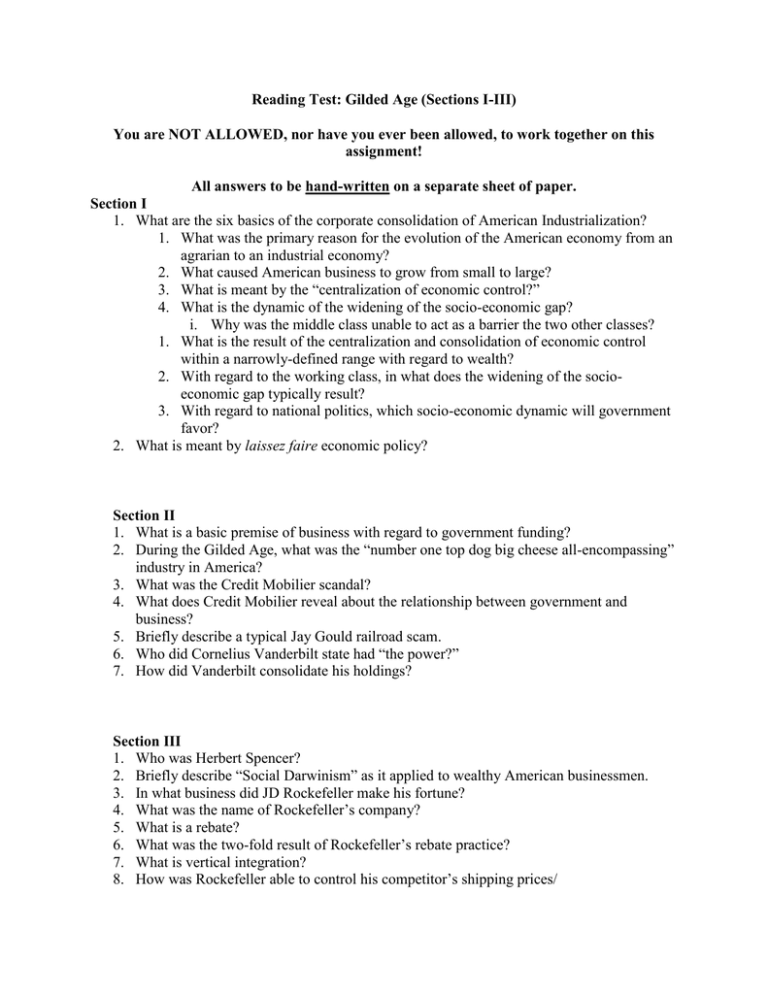
Reading Test: Gilded Age (Sections I-III) You are NOT ALLOWED, nor have you ever been allowed, to work together on this assignment! All answers to be hand-written on a separate sheet of paper. Section I 1. What are the six basics of the corporate consolidation of American Industrialization? 1. What was the primary reason for the evolution of the American economy from an agrarian to an industrial economy? 2. What caused American business to grow from small to large? 3. What is meant by the “centralization of economic control?” 4. What is the dynamic of the widening of the socio-economic gap? i. Why was the middle class unable to act as a barrier the two other classes? 1. What is the result of the centralization and consolidation of economic control within a narrowly-defined range with regard to wealth? 2. With regard to the working class, in what does the widening of the socioeconomic gap typically result? 3. With regard to national politics, which socio-economic dynamic will government favor? 2. What is meant by laissez faire economic policy? Section II 1. What is a basic premise of business with regard to government funding? 2. During the Gilded Age, what was the “number one top dog big cheese all-encompassing” industry in America? 3. What was the Credit Mobilier scandal? 4. What does Credit Mobilier reveal about the relationship between government and business? 5. Briefly describe a typical Jay Gould railroad scam. 6. Who did Cornelius Vanderbilt state had “the power?” 7. How did Vanderbilt consolidate his holdings? Section III 1. Who was Herbert Spencer? 2. Briefly describe “Social Darwinism” as it applied to wealthy American businessmen. 3. In what business did JD Rockefeller make his fortune? 4. What was the name of Rockefeller’s company? 5. What is a rebate? 6. What was the two-fold result of Rockefeller’s rebate practice? 7. What is vertical integration? 8. How was Rockefeller able to control his competitor’s shipping prices/ 9. Define the following: 1. A monopoly 2. An oligopoly 3. The cartel 4. The trust 10. What was the Sherman-Anti Trust Act (1890) designed to do? 11. Why was the Sherman Anti-Trust Act a flop? 12. In what industry did Andrew Carnegie make his fortune? 13. What is the Bessemer Process? 14. What does the term “economies of scale” mean? 15. How can a businessman make money while lowering his price? 16. What was the overall effect of Carnegie’s operating at economies of scale? 17. What was the Gospel of Wealth? 18. Briefly explain the connection between Carnegie’s Gospel of Wealth and Social Darwinism. (Think of this in terns of essay material.) 19. What was JP Morgan’s occupation? 20. What was the affect of Morgan’s stock purchases on the value of the stock? 21. Why did companies seek Morgan as an investor in their stock? 22. Describe how Morgan’s version of the “corporate takeover” worked. 23. What was the difference in Morgan’s holdings and those of Vanderbilt, Rockefeller, or Carnegie? 24. What was Morgan’s greatest achievement? 25. What company did Morgan form with his steel holdings? 26. What is horizontal integration? 27. Briefly describe the philosophical difference between “Captains of Industry” and “Robber Barons.” (Again, think essay material here.)
